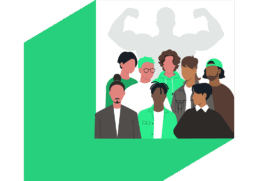
Masculinity Toolkit
Masculinity Toolkit
Toolkit collated by Lewis Wedlock
Masculinity has never been so culturally pertinent or polarising in the context of our culture; we are inspecting and examining the taken for granted assumptions of what constitutes manhood in a way that is not just challenging, but existentially confusing.
What are we talking about when it comes to masculinity today? What is the “right” approach to working with masculinities in schools? What is the best way to combat the rise of misogyny and sexism in our classrooms?
These questions allude to a sense of concreteness or conceptual rigidity which is for the most part, impossible to ascertain as educators and as a wider culture. Masculinity is not a fixed entity; it is a fluid, dynamic, plural and personal expression. There is no magic approach to working with masculinities in schools either; there are several perspectives and approaches that can be hugely impactful when it comes to cultivating “effective” masculinity work.
The purpose of this toolkit is not to provide concrete answers relating to working with masculinities in schools, but it does hope to take you on a rich journey filled with different voices, articles, reflective questions and videos to unearth your proximity to the masculinity conversation.
The Diverse Educators’ Masculinity Toolkit
- How do you personally define masculinity?
- What social, cultural and personal inputs did you draw from to define masculinity?
- Do you think your students have different ideas of masculinity? If so, in what way?
- In what ways might I (consciously or unconsciously) reward or reinforce traditional gender norms in my classroom or school setting?
- When I hear the term “toxic masculinity,” what is your immediate reaction — and where do you think that reaction comes from?
- What kinds of male role models are visible in your curriculum or wider school environment — and what messages do they send about power, emotional expression, structural awareness and accountability?
- How do race, class, disability, sexuality, or neurodivergence intersect with how masculinity is experienced, judged, or policed in your educational setting?
Articles
Blogs
Jonathon Reed for Next Generation Men
Introducing a Podcast Series on the Intersection of Youth, Masculinity and Race
Jonathon Reed for Next Generation Men
Research Report: What We’ve Learned About the Online Lives of Boys Who Are Embracing Positive Masculinity
Jonathon Reed for Next Generation Men
6 Things Educators Should Know About Positive Masculinity

